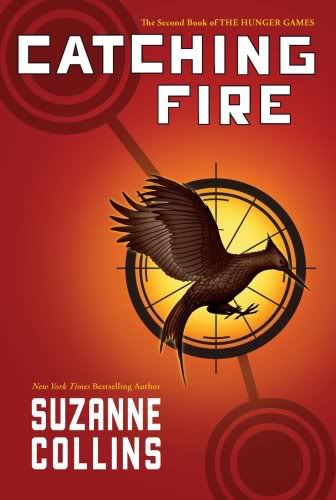Review - Catching Fire by Suzanne Collins

Things in Panem have definitely caught fire. After Katniss and Peeta’s miraculous double victory, they are taken back to District 12. There’s only a little downtime before the Victory Tour begins and the two are carted away with their retinue of stylists, designers, and Haymitch to visit each of the districts in a prolonged celebration of their survival. If only Collins left it at that; if only the crowds weren’t straining behind happy façades or that Katniss hadn’t just played along in Book One and really loved Peeta in the way we all know he deserves; if only the districts weren’t so poor; if only they hadn’t had to rebel 75 years ago; if only President Snow wasn’t around.
I could not put this book down (That’s happening a lot lately: Boneshaker, Leviathan…). If anything, Catching Fire is darker than The Hunger Games, and ten times more addicting. There are unbelievably more complications and more convoluted, morally-troubling alliances. The consequences are heavier and the relationships are more difficult. In short, Catching Fire has everything The Hunger Games offered plus extra, just for spite. President Snow, in case you ever wanted to know, is one creepy, malicious fellow who really has no business running a country. Except, I kept wondering why it’s President Snow who’s in charge and, what happened 75 years ago exactly? Was he, like the victors of the Games he enforces, just the lucky one, the most ruthless one, who made it out on top? Catching Fire doesn’t answer those questions--it gives us more. A rebellion is growing with Katniss at its center, rumors circulate about District 13, and there’s an even darker pallor coloring this year’s Hunger Games.
Catching Fire is more a study of Panem and the day-to-day fears of District 12 that are, ironically, not at all alleviated by Katniss and Peeta’s victory. President Snow is infuriated with the duo’s subversive tactics that undermine everything he exists to enforce. On a personal visit, he makes barely civilized threats that would flatten anyone other than Katniss. Dozens of new Peacekeepers are brought in to fix the lax in law enforcement. Security is tightened, demonstrations made public, and it’s all Katniss can do not to just grab her loved ones and run away. She can’t leave, not yet anyway. This year marks the 75th anniversary of the districts’ defeat and the third Quarter Quell: a quarter century celebration that compounds the yearly Game into a warped celebration of itself, more ruthless and cutthroat than usual (as if the districts need reminding they are beneath the Capitol’s contempt). This year, the twist is terrifying and white-knuckle-inducing.
Just when I thought Catching Fire couldn’t be any more dramatic or horrific, Collins put in another, if condensed, version of the Games in the last third of the book. Before I could wonder if she was going to risk ruining such an amazing trilogy with the overuse of the same ploy (rendering it a useless plot device), she surprised me. I should have known. There’s a lot of suspicion and fear in this book, but for the most part, it’s political, however, frightening on the scale that survival was for The Hunger Games. The ominous threat of the Capitol and What It’s Going To Do To The Districts that was a constant source of paranoia in the first book, is made real in Catching Fire. We don’t just hear by way of past events or safe assumptions, we see people being punished, things set on fire, food taken away. The districts in their entirety suffer Katniss and Peeta’s victory, but they also internalize the couple’s single act of rebellion, spurned by shared disgust and frustration, united by the love story played out before the cameras.
The symbolism of the mockingjay is teased out to the max as is Cinna’s initial genius in the wardrobe department. His designs moved a nation to rethink the way the game has been played for so long; because Collins likes her metaphors, his costumes also contribute to Katniss becoming an idea, not just another winner. Collins has a way with suspense and reality. As a reader, you really feel the emotions her characters experience. As a result, I absolutely loved the scene where Katniss thinks she’s seeing a kiss instead of the obvious (not mentioned here to avoid spoilers). Even though I knew what it was she must really be seeing, I couldn’t help but be drawn in to what she thought she was seeing. In the end, I laughed out loud when she came to her senses.
There’s so much tension in this book; I felt both exhausted and exhilarated by the last page. There isn’t a single character who lacks definition or who isn’t interesting in some way. Everything is just so good! I always feel bad when I write about a book I loved because I can never say exactly what I want to say. Trust me, though, if you’ve read The Hunger Games (and if not, why haven’t you?), Catching Fire is a must read. Don’t listen to anyone who dismisses the series out of some antiquated loyalty to Battle Royale or any other predecessor with similar plot elements or storyline. This series has earned the right to have its own place on your bookshelf.
Thank you to Book Love Affair for the contest prize. :)